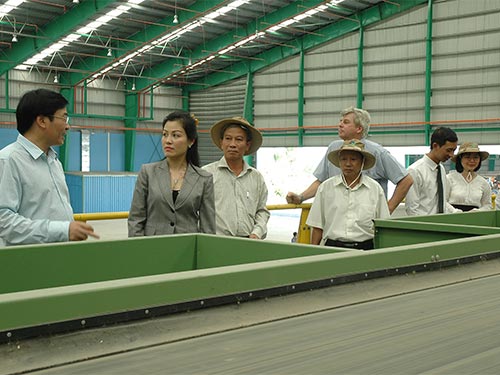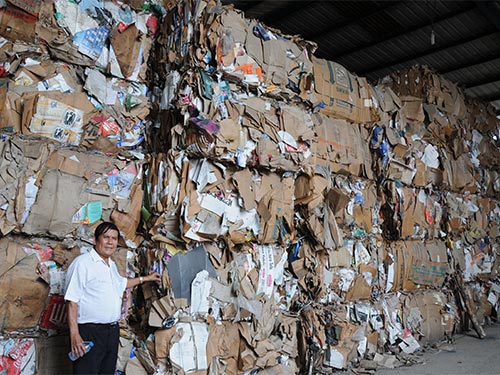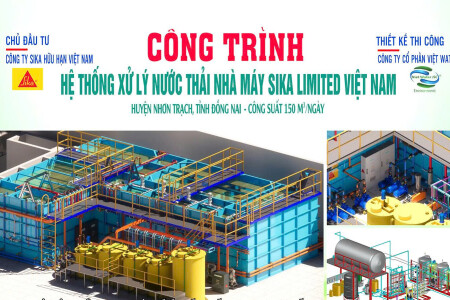Discover the wastewater treatment system (150 m³/day) designed and constructed by VIET WATER JSC for...
Developing the recycling industry: Many benefits
Developing the recycling industry: Many benefits
The future recycling industry contributes to saving forest resources, iron and steel, plastic, creating renewable energy, creating jobs for thousands of workers.

Ms. Huynh Thi Lan Phuong, Deputy General Director of VWS Company, guided the delegation of the Ministry of Construction to visit the waste sorting and recycling factory
The recycling of domestic, industrial, medical waste... from sources across the country is currently being carried out by small, scattered facilities with outdated treatment technology; most do not have wastewater treatment systems, waste gas treatment. These facilities are mainly located in residential areas, causing air, soil and water pollution in the environment.
Saving resources and energy
Raw materials for paper production are mainly obtained from planted forest wood. To produce 1 ton of pulp, we need to exploit from 2.8-3 m3 of hybrid acacia wood and the planting time can take 5-7 years. Due to limited timber exploitation from plantation forests, in recent years the Vietnamese paper industry has used scrap paper to replace hybrid acacia wood. However, scrap paper in Vietnam can only meet 20% of the demand for raw materials for the paper industry, the rest must be imported. Mr. Duong Van Cao, Chairman and General Director of Xuan Duc Paper Joint Stock Company in Ho Chi Minh City, said that businesses in the paper industry, in addition to purchasing domestic scrap paper for recycling, also have to import paper. waste from the US, Japan, Korea, Singapore and African countries. According to manufacturers, imported scrap paper has a higher price than domestic scrap paper, but most companies have to import to ensure the source of raw materials for production. According to Mr. Phan Minh Nghia, Deputy General Director of Tan Mai Group Joint Stock Company, the scrap industry is currently unable to meet the demand for domestic paper recycling factories due to spontaneous collection of scrap from local paper mills. bottle shop. Vietnam has not formed a professional scrap collection industry like other countries. The recycling industry in the future will contribute to saving forest resources, iron and steel, plastic; create renewable energy, create jobs for thousands of workers.
Find the solution to the problem of recycled materials
According to the plastic industry development plan of the Ministry of Industry and Trade to 2020 and a vision to 2025, one of the development orientations of the plastic industry is to encourage the strong development of the scrap and waste treatment industry. Accordingly, Vietnam Plastics Joint Stock Company (Vinaplast) plans to cooperate with Merlin Plastics Company (Canada) to establish a joint venture to invest in building 2 plastic scrap processing plants in Hung Yen and Binh Duong. The capacity of each factory is about 50,000 tons/year. Recently, the project has adjusted the factory capacity to 40,000 tons/year, with an investment of about 450 billion VND. However, this project is still… on paper. The reason for the delay in project implementation is due to insufficient resources for recycling. Scraps are mainly from small bottles and bottles scattered in residential areas, recycling businesses also have their own collection systems, but they cannot get enough scrap. The waste collection system in our country is still small, fragmented, spontaneous, not organized on a large scale like in advanced countries. The strong scrap collection everyone does, each facility, each barn owner classifies scrap according to his or her own type, not according to any standard. Therefore, the problem for the source of raw materials of the recycling industry has not yet been solved.

Xuan Duc Paper Joint Stock Company has to import high-priced scrap from abroad to meet enough raw materials for paper production
In 2006, Vietnam Solid Waste Treatment Company Limited (VWS), the investor of Da Phuoc Solid Waste Treatment Complex, built a recycling waste sorting plant according to US technology. capacity of 500 tons/day in the Da Phuoc Solid Waste Treatment Complex under the contract signed with the People's Committee of Ho Chi Minh City. The total investment for this grading plant is more than 10 million USD from loan capital. The factory's line has been installed completely, but because the city has not had a program to separate waste at source, so far there is no source of recyclable waste for the plant to operate. Therefore, VWS recently proposed the HCM City People's Committee to have a direction so that this factory can go into operation, creating jobs for local people while waiting for the city's waste separation program at source to avoid waste in investment. Mr. David Duong, General Director of VWS Company, said that recycling solutions and the export and import of scrap are widely applied in developed countries, and need to be encouraged in Vietnam to serve production in the future. country. According to him, this not only makes sense in terms of protecting the environment, saving natural resources but also creating jobs for the society.
Faced with the fact that scrap recycling factories have been and are planning to invest to treat thousands of tons of waste that are dumped into the environment every day, causing heavy pollution, affecting the health of people and localities. It is necessary to implement a program of waste separation at source soon. At the same time, there is a policy to support enterprises to recycle and use raw materials from recycling; manage scrap collection facilities to one focal point; planning and strictly controlling small recycling facilities in order to contribute to environmental protection.
USA: 90 billion USD/year from scrap recycling
The scrap recycling industry in the US generates over $90 billion in revenue each year, and billions of dollars in China's revenue. It not only brings economic benefits but also makes sense in environmental protection. The developed scrap recycling industry will be a source of input materials for other manufacturing industries such as paper, plastic, metal, glass...
In developed countries, associations of businesses specializing in the collection and classification of scrap operate very professionally. These enterprises provide a very stable source of scrap materials to the world market. Scrap collection and recycling is a very developed industry in major countries such as the United States, China, etc. This industry always brings high revenue and profit regardless of economic situation up or down.


